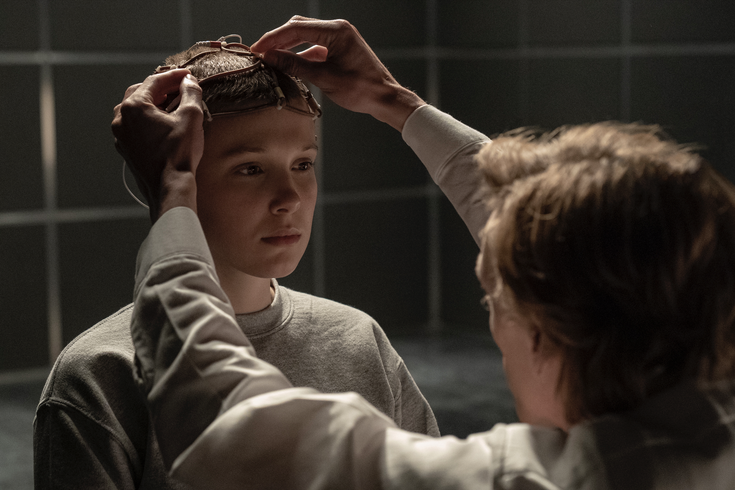
June 29, 2022
 Tina Rowden/Netflix
Tina Rowden/Netflix
Medical students at Rutgers University will study 'Stranger Things 4' as part of a psychiatry course examining the Netflix series' thematic depictions of mental health. Mille Bobby Brown, who plays Eleven, is pictured above in a production photo.
The clock is ticking down to the Season 4 finale of Netflix's sci-fi mega-series "Stranger Things," with the two final episodes set to hit the streaming platform Friday. With a run-time of more than two hours, the final episode has been hyped as a game-changer full of carnage that will leave fans floored by the conclusion.
As much as "Stranger Things" has been a blast of mystery, action and cloying 1980s nostalgia, the series also has earned praise for mining deeper issues about identity, friendship, alienation, community and mental health. This is especially true in Season 4, whose menacing Upside Down villain, Vecna, preys on the trauma of his victims to lure them into his sinister service.
At Rutgers University, psychiatry professor Anthony Tobia will tap into the Duffer brothers' series to teach a course on psychiatric disorders. Some of the show's characters display hallmark signs of post-traumatic stress disorder and other mental illnesses that can be used to illustrate how they affect people in day-to-day life.
"When you watch a series as thought provoking as Stranger Things, there is a tendency for people to not only watch but identify with the characters with similar feelings," Tobia told Rutgers Today. "To identify those feelings in oneself, ushered with a relationship forged with a fictional character, there is a window of opportunity for individuals to identify and therefore take action in their own lives."
The elective course, called "Twittervision," will have students at Rutgers Robert Wood Johnson Medical School share their psychiatric opinions about the characters and plot lines, using the Twitter hashtag #RWJstrangerthings.
Critics of the season's first seven episodes have widely written that the series attempts to symbolize mental illness and highlight the importance of mental health. The discussion of "Stranger Things" as an allegory led Tobia's students to choose the series as the focal point of the course.
"For most people, it comes from left field when you incorporate films and TV shows into curriculum, especially medical school curriculum," Tobia said. "But the bottom line is great shows make for great lectures. If you really want buy in from students, 95% of whom are not going to go into psychiatry, I found if you let the students tell you what that great show is, the buy in is that much easier."
The complexity of "Stranger Things" lies in the history behind Vecna's dark and murderous rampage in Hawkins.
Through the first seven episodes, released last month on Netflix, viewers learned that Vecna was originally Henry Creel, a young boy in Hawkins who possessed psychokinetic powers. Henry's father, Victor, was a World War II veteran who had moved his family into a beautiful home, where Henry used his powers to mysteriously kill his mother and sister.
Victor Creel was falsely accused of the murders and thrown into a psychiatric facility. Henry was taken in by Dr. Martin Brenner at the secretive Hawkins Lab to have his unusual powers studied.
Henry soon became One, the first of many children who underwent rigorous experiments at the Hawkins Lab to harness their abilities as tools for national defense. One fell out of favor with Dr. Brenner for disobedience and was made to be a lab orderly for the other children, including Eleven.
Buried within Eleven's repressed memories was a massacre at the Hawkins Lab that preceded her escape at the beginning of Season 1. In Season 4, she discovers that One was responsible for killing the other children. The cliffhanger before the final two episodes is that Eleven used her own powers to defeat One and send him to the Upside Down, where he transformed into Vecna. He's been responsible for killing people in Hawkins and dragging them to the Upside Down to amass power over the town.
As supernatural as the story is, the root of Vecna's evil is his tormented past. He lures Hawkins residents to their grisly, bone-breaking deaths by delving into their traumatic experiences. Specifically, he targets people who feel saddled with guilt, or who underwent scarring life experiences.
Vecna's most prominent would-be victim in the show is Hawkins High School student Max Mayfield. Her older step-brother, Billy Hargrove, was killed before her eyes by a giant Spider Monster in the Season 3 finale. The first episodes of Season 4 show Max in the throes of depression, detached from her friends and struggling academically. Once Vecna has already killed a few other Hawkins residents, he turns his attention to Max.
The depiction of Vecna's power over his victims shows them in dark, trance-like states that are signaled by the ticking of a distorted clock. They retreat within their minds, frozen in the real world, as Vecna's voice casts blame on them for the traumas and regrets they feel.
With a little bit of detective work, Max's friends discover that music has the power to break Vecna's mind control and prevent him from killing her. They give her a cassette tape of her favorite song, Kate Bush's 1985 hit "Running Up That Hill," and successfully bring her back to reality.
Tobia told Rutgers Today that the scenes showing Vecna's powers are reminiscent of the symptoms people experience when suffering from PTSD, depression and anxiety.
"There are early warning signs for those struggling with those mental illnesses. Be aware of your surroundings and situations, and when you see things 'go dark,' do not ignore that warning sign," Tobia said. "This idea of, 'Well, if I don't pay attention, it will just go away.' Doesn't work. When things go dark, metaphorically or literally when they enter into the Upside Down, that is not a time to ignore your surroundings, it is a time to take action."
The show can be used as a point of instruction to help people recognize signs of mental illness and seek professional help, Tobia added. That may include developing methods to counteract troubling thoughts and finding protective activities that uplift people who are in mental distress.
Most importantly, Tobia believes the popularity of "Stranger Things" can be used to bring conversations about mental health to the forefront.
"When you watch a series as thought provoking as 'Stranger Things,' there is a tendency for people to not only watch but identify with the characters with similar feelings," Tobia said. "To identify those feelings in oneself, ushered with a relationship forged with a fictional character, there is a window of opportunity for individuals to identify and therefore take action in their own lives."
Tobia plans to restrain himself from watching Season 4 until his "Twitterverse" course begins in January, which means he'll have to drown out reactions to one of the most popular television series of the streaming era.
For the rest of us, answers to Season 4's open questions will come Friday. And it might not hurt to view "Stranger Things" through a lens that goes beyond pure sci-fi entertainment.